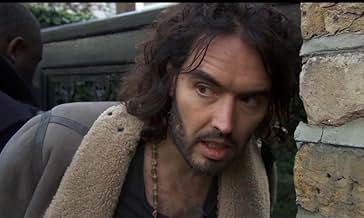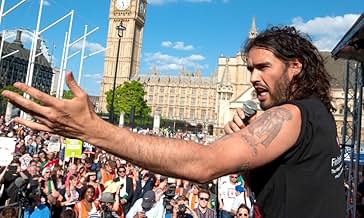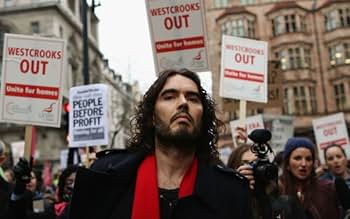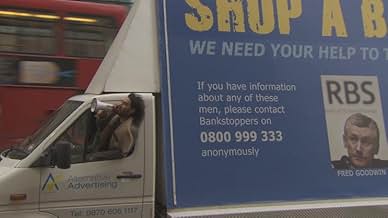CALIFICACIÓN DE IMDb
7.0/10
1.4 k
TU CALIFICACIÓN
Agrega una trama en tu idiomaA look at the growing disparity between different economic classes.A look at the growing disparity between different economic classes.A look at the growing disparity between different economic classes.
- Dirección
- Guionistas
- Elenco
Geraint Anderson
- Former Banker Dresdener Kleinwort
- (material de archivo)
Brigitte Bardot
- Self
- (material de archivo)
Jean-Paul Belmondo
- Self
- (material de archivo)
Richard Brooks
- Former HMRC Tax Inspector
- (material de archivo)
- …
Warren Buffett
- CEO Berkshire Hathaway
- (material de archivo)
George W. Bush
- Former President, USA
- (material de archivo)
David Cameron
- Prime Minister, UK
- (material de archivo)
John Christensen
- Economist
- (material de archivo)
- …
Andrew Craig
- Former Banker UBS
- (material de archivo)
Reece Davis-James
- Looter
- (material de archivo)
- …
Bill de Blasio
- Mayor of New York City, USA
- (material de archivo)
- (as Mayor Bill de Blasio)
David DeGraw
- Occupy Activist
- (material de archivo)
Bob Diamond
- CEO Barclays Bank
- (material de archivo)
Bernie Ecclestone
- Chief Executive Formule One
- (material de archivo)
Milton Freedman
- Economist, USA
- (material de archivo)
Fred Goodwin
- Former CEO Royal Bank of Scotland
- (material de archivo)
Philip Green
- Owner Topshops
- (material de archivo)
- Dirección
- Guionistas
- Todo el elenco y el equipo
- Producción, taquilla y más en IMDbPro
Opiniones destacadas
He's bringing up some really good points about the lawlessness of the city when it comes to financial crimes committed by the banks.
One thing he keep's blaming it on is a 'free market' This is just simply not true, we don't have a free market by any stretch of the imagination.
We live in an oligarchy with the rich being above the law.
Don't be fooled, more power to government is not the answer.
There's been many attempts to blame it on capitalism, since Marx. This has never and will never lead to a revolution that will do the common people any good whatsoever.
One thing he keep's blaming it on is a 'free market' This is just simply not true, we don't have a free market by any stretch of the imagination.
We live in an oligarchy with the rich being above the law.
Don't be fooled, more power to government is not the answer.
There's been many attempts to blame it on capitalism, since Marx. This has never and will never lead to a revolution that will do the common people any good whatsoever.
Sometimes life is simply not fair. Bad luck can visit us all.
What this film lays bare is that you can work hard all your life, try to stack the chips in your favour by doing that, and yet simply be screwed over by the wealthy powerful who gorge themselves on their wealth and power. It's not just a case of the have-nots being jealous of the haves. It's a case of the haves not being even remotely benign or even grateful to those who work hard all their lives to maintain the wealth creating machines. It's done by smoke and mirrors. The film shows British politicians using key words and phrases to convince voters that they are on their side, understand their daily grind and to convince them that they are their people. It also blows away the notion that the rich are 'wealth creators' as if there would be no wealth, happiness or even jobs in our society if it wasn't for Amazon or Google and the like. The post war period was one of cooperation and relative 'happiness' when CEO salaries were more in line with workers salaries and the taxpayer didn't need to subsidise corporations by subsidising low wages for example or by bailing out failed banks and financial institutions.
The film shows that we clearly live in a society where the wealthy are in control and, by lobbying, donating to, and employing MPs they can make laws that suit them.
One big message from the film is that collective action can work, as a starting point. See the film to see that in practice.
Thank you Russel, you weird combination of knowledgeable man and cheeky child. Keep it up.
What this film lays bare is that you can work hard all your life, try to stack the chips in your favour by doing that, and yet simply be screwed over by the wealthy powerful who gorge themselves on their wealth and power. It's not just a case of the have-nots being jealous of the haves. It's a case of the haves not being even remotely benign or even grateful to those who work hard all their lives to maintain the wealth creating machines. It's done by smoke and mirrors. The film shows British politicians using key words and phrases to convince voters that they are on their side, understand their daily grind and to convince them that they are their people. It also blows away the notion that the rich are 'wealth creators' as if there would be no wealth, happiness or even jobs in our society if it wasn't for Amazon or Google and the like. The post war period was one of cooperation and relative 'happiness' when CEO salaries were more in line with workers salaries and the taxpayer didn't need to subsidise corporations by subsidising low wages for example or by bailing out failed banks and financial institutions.
The film shows that we clearly live in a society where the wealthy are in control and, by lobbying, donating to, and employing MPs they can make laws that suit them.
One big message from the film is that collective action can work, as a starting point. See the film to see that in practice.
Thank you Russel, you weird combination of knowledgeable man and cheeky child. Keep it up.
After watching this documentary, the children were impressed so I asked them to reach for their mobile phones and google "how many phones are in the world". They know no other phones than mobile phones and no better source than Wikipedia. Probably, neither do you.
Wikipedia told them that there are approximately over 6,800,000,000 mobile phones in use for a global population of 7,012,000,000. They also delighted themselves by looking up the breakdown by country etc. Please also do so yourself.
Thirty, forty years ago no one could have thought that by today each person would have their own private phone line, much less in their pocket, and to boot, not just a phone but a computer.
Yet the poor are getting poorer, we are told.
I wonder what this documentary would have been like if instead of wealth, Russell Brand had had knowledge or commonsense. We will never find out.
Wikipedia told them that there are approximately over 6,800,000,000 mobile phones in use for a global population of 7,012,000,000. They also delighted themselves by looking up the breakdown by country etc. Please also do so yourself.
Thirty, forty years ago no one could have thought that by today each person would have their own private phone line, much less in their pocket, and to boot, not just a phone but a computer.
Yet the poor are getting poorer, we are told.
I wonder what this documentary would have been like if instead of wealth, Russell Brand had had knowledge or commonsense. We will never find out.
I don't really follow celebrity culture, and just in case you think that means I'm far too highbrow to do so, I also am pretty bad at following the other end of that spectrum either. I mention this because Russell Brand is in both of those in some ways, and in both areas I am aware of him but little more than that – for some reason I don't care for him when I have seen him, but at the same time I would struggle to specifically tell you what I have seen him in. This film of course got more attention due to his involvement, and it was this publicity that drew me to watch the film, even if it was the message that I actually wanted to hear.
In terms of that message, it is perfectly worthy and valid, and, as Brand says at the start of the film – really nothing you have not heard before. Problem with that sentence is that it is only part of the truth, because not only will you have heard all of this before, but predominately you will have heard it all done better too. Brand seems to have been identified as the key problem with the film, but for me the whole approach and tone of the film is off – okay it is off because it is modeled around the Brand brand (if you will) but this is not a solo project, there are other people who should have evened this out, not least of which is Winterbottom. The issue with the film is evident from the very start, because no matter its other faults, the film is at least consistent across its running time. It appears to be aimed at 'the people', or at least the perception of who 'the people' are. What this means in reality is that we have the 'geezer' factor turned up to 11, everything is a little bit cheeky, and things are played out in very simple terms, and with a very basic structure and approach.
For some maybe this will win you over, but personally I found it grating and patronizing – and not just Brand. To focus on the content (as we should), the film has this great point, but it makes it far too simply; getting school children to yell out like the film is a panto doesn't work, and the film not having access to people beyond security guards also doesn't work. Many other devices and specifics fall flat, and the fact we have heard this all before does tend to come across even louder – and the fact it isn't working just highlights how much better others have covered the same material, whether in documentaries or in satirical news shows. This is my fundamental problem with the film – that it doesn't make its case at all well; however there is no point in me pretending that Brand himself is not a big part of this. His style and manner here seems so insincere and patronizing. His efforts to 'speak to the people' seem too labored, and his many throwaway sentences attempting to charm just grated on me; he does appear to have good intentions, but he overplays the act of 'I'm just a simple bloke me, just a local boy like yourself mate' – for example saying he doesn't know anything about Libor when he so clearly does, as if angry ignorance is something he thinks will appeal to those watching (which maybe is true, but it still speaks to his views on the 99% when he thinks such a character is one we will appreciate). To be fair, in the film people do seem to respond to this approach, so he may well be a matter of taste.
Ultimately the film is Brand and it is hard to separate them. As such it is a film with a mostly worthy message and intent, but done in an insincere and messy fashion which seems to be trying to ingratiate itself to the populace but actually just comes off as an insincere act which at best is a bit grating, and at worst is patronizing and condescending.
In terms of that message, it is perfectly worthy and valid, and, as Brand says at the start of the film – really nothing you have not heard before. Problem with that sentence is that it is only part of the truth, because not only will you have heard all of this before, but predominately you will have heard it all done better too. Brand seems to have been identified as the key problem with the film, but for me the whole approach and tone of the film is off – okay it is off because it is modeled around the Brand brand (if you will) but this is not a solo project, there are other people who should have evened this out, not least of which is Winterbottom. The issue with the film is evident from the very start, because no matter its other faults, the film is at least consistent across its running time. It appears to be aimed at 'the people', or at least the perception of who 'the people' are. What this means in reality is that we have the 'geezer' factor turned up to 11, everything is a little bit cheeky, and things are played out in very simple terms, and with a very basic structure and approach.
For some maybe this will win you over, but personally I found it grating and patronizing – and not just Brand. To focus on the content (as we should), the film has this great point, but it makes it far too simply; getting school children to yell out like the film is a panto doesn't work, and the film not having access to people beyond security guards also doesn't work. Many other devices and specifics fall flat, and the fact we have heard this all before does tend to come across even louder – and the fact it isn't working just highlights how much better others have covered the same material, whether in documentaries or in satirical news shows. This is my fundamental problem with the film – that it doesn't make its case at all well; however there is no point in me pretending that Brand himself is not a big part of this. His style and manner here seems so insincere and patronizing. His efforts to 'speak to the people' seem too labored, and his many throwaway sentences attempting to charm just grated on me; he does appear to have good intentions, but he overplays the act of 'I'm just a simple bloke me, just a local boy like yourself mate' – for example saying he doesn't know anything about Libor when he so clearly does, as if angry ignorance is something he thinks will appeal to those watching (which maybe is true, but it still speaks to his views on the 99% when he thinks such a character is one we will appreciate). To be fair, in the film people do seem to respond to this approach, so he may well be a matter of taste.
Ultimately the film is Brand and it is hard to separate them. As such it is a film with a mostly worthy message and intent, but done in an insincere and messy fashion which seems to be trying to ingratiate itself to the populace but actually just comes off as an insincere act which at best is a bit grating, and at worst is patronizing and condescending.
Labelled as a film regarding the growing disparity between economic classes, Michael Winterbottom's The Emperor's New Clothes is an effective documentary balancing political and economic investigation with Russell Brand's palpably galvanic and marmite personality.
The film combines interviews with Brand himself, along with politicians and bankers. Brand begins by summating that much of what will be explored in the documentary won't be instantaneously enlightening, a far stretch from the explosively impactful manner as last year's masterful Citizen Four. Despite this, where I do believe the film achieves success is in its exposing of issues and its raising of awareness towards certain issues. As aforementioned, much of Brand's insight is foreseeable to those of a certain age. However; the teenage and young adult audience, much of what is explored could be thought-provoking, and is presented in a straightforward and confronting style which appears purposeful yet remains focused throughout. This, taken in combination with Brand's personality, does make what initially appears challenging subjective matter abundantly more digestible.
What is problematic is that the film at times felt like a flaccid attempt of a brief Russell Brand biopic. For the majority of the film Brand's presence is handled adeptly, yet I find at times the focus on his unabashed comedic set pieces (pleading at the top of his voice to bystanders to give up corrupt bankers and his Michael Moore-ish attempt of breaking and entering a bank) turned the focus from suggested gargantuan corruptness into a love letter to Brand's eccentricity. For fans of Brand, it's nothing particularly abhorrent, but for those on the other side of the fence, this shift will do little to convince them to change their tune.
The film combines interviews with Brand himself, along with politicians and bankers. Brand begins by summating that much of what will be explored in the documentary won't be instantaneously enlightening, a far stretch from the explosively impactful manner as last year's masterful Citizen Four. Despite this, where I do believe the film achieves success is in its exposing of issues and its raising of awareness towards certain issues. As aforementioned, much of Brand's insight is foreseeable to those of a certain age. However; the teenage and young adult audience, much of what is explored could be thought-provoking, and is presented in a straightforward and confronting style which appears purposeful yet remains focused throughout. This, taken in combination with Brand's personality, does make what initially appears challenging subjective matter abundantly more digestible.
What is problematic is that the film at times felt like a flaccid attempt of a brief Russell Brand biopic. For the majority of the film Brand's presence is handled adeptly, yet I find at times the focus on his unabashed comedic set pieces (pleading at the top of his voice to bystanders to give up corrupt bankers and his Michael Moore-ish attempt of breaking and entering a bank) turned the focus from suggested gargantuan corruptness into a love letter to Brand's eccentricity. For fans of Brand, it's nothing particularly abhorrent, but for those on the other side of the fence, this shift will do little to convince them to change their tune.
Selecciones populares
Inicia sesión para calificar y agrega a la lista de videos para obtener recomendaciones personalizadas
Detalles
Taquilla
- Total a nivel mundial
- USD 50,539
- Tiempo de ejecución
- 1h 41min(101 min)
- Color
Contribuir a esta página
Sugiere una edición o agrega el contenido que falta






























